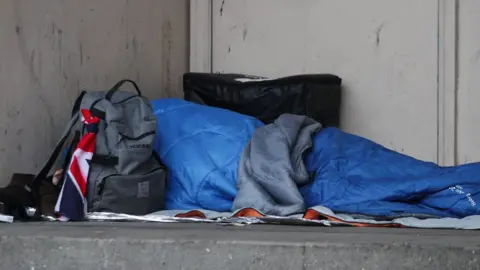Homelessness could end in a decade, says charity Crisis
 PA
PAThe UK could see an end to homelessness within 10 years if the government embraces certain policies, according to the homeless charity Crisis.
In a newly-published report, Crisis sets out a comprehensive plan to make homelessness "a thing of the past".
It says 100,500 social homes need to be built each year for the next 15 years.
"We must not become a society that simply accepts homelessness as 'a sad fact of life'... it doesn't have to be this way," said Crisis's Jon Sparkes.
The charity estimates that there are currently 236,000 homeless people across England, Wales and Scotland, including those living in unsuitable temporary accommodation.
Their report, Everybody In: How To End Homelessness In Great Britain, follows work with the Chartered Institute of Housing, Heriot-Watt University, the National Housing Federation, and PricewaterhouseCoopers (PwC).
The findings, endorsed by experts from around the world, include the following proposals:
- 100,500 social homes to be built annually for the next 15 years to meet the needs of the homeless and those on low incomes
- A national roll-out of Housing First, which aims to provide more than 18,000 homeless people with homes and a package of specialised support
- Better rights for private renters and a reform to housing benefit, to protect people once they have been housed
- Hospitals, prisons, the care system, and other parts of the state to be legally required to help find homes for those leaving their care
- Job Centres to have homelessness specialists
"For the first time ever, we have a comprehensive plan that shows exactly how we can address the root causes of homelessness and make it a thing of the past," said Mr Sparkes, chief executive of Crisis.
"Other parts of the world are taking huge strides towards ending it, and Britain can too."
The call for funding for new homes is also being backed by the Local Government Association, which represents local authorities in England.

Tony's story
After his long-term relationship ended, things spiralled for Tony.
"I lost my job, my relationship, my home and eventually ended up on the streets," he told BBC Radio 4's Today.
For two years he was sleeping in cardboard boxes and doorways in central London.
"It was quite hellish," he said.
"For the first six months it was absolutely numbing. It was a total sensory perception shut down."
The biggest barrier to him finding help was himself.
"My self esteem just disappeared," he said.
"I felt embarrassed, ashamed, I was very depressed and at some stages contemplated suicide."
But eventually he did get help and, with the support of Crisis, now has a home and a job working for a local council's housing advice and homelessness team.
"It's been an absolute turnaround," he said.

A recent report by Shelter, using existing government figures, found that more than 100,000 households in England had been on the waiting list for council housing for more than a decade.
Responding to the Crisis report, the Ministry of Housing, Communities and Local Government said it was committed to tackling homelessness and rough sleeping.
"We are investing more than £1.2bn to tackle all forms of homelessness," said a spokesman.
The spokesman highlighted last week's announcement of £30m for councils "to help boost support available to people living on the streets".
"We are also investing £9bn to build more affordable homes and are piloting the Housing First approach in three major regions to get people off the streets and into stable accommodation."
